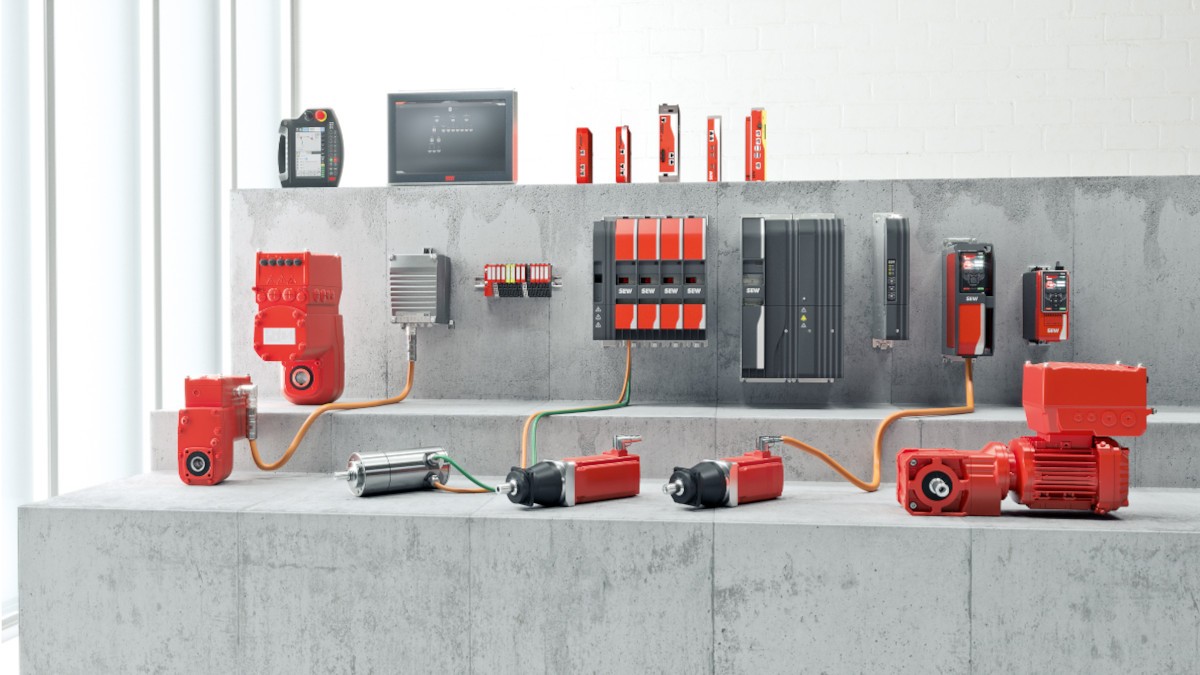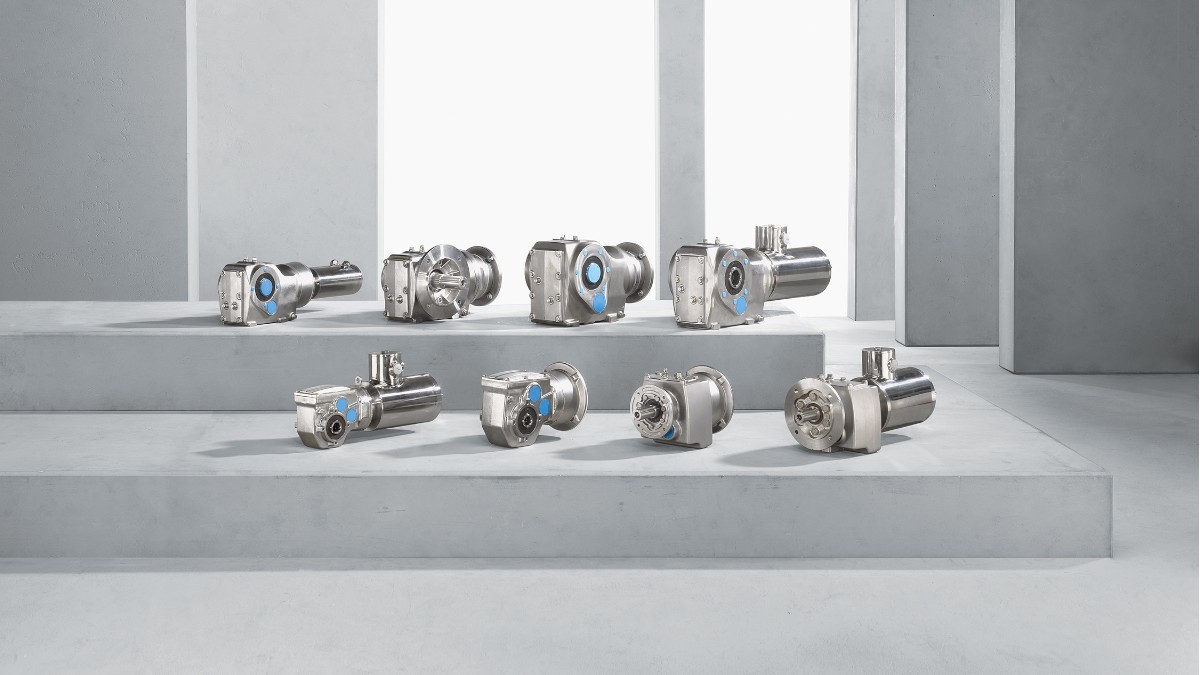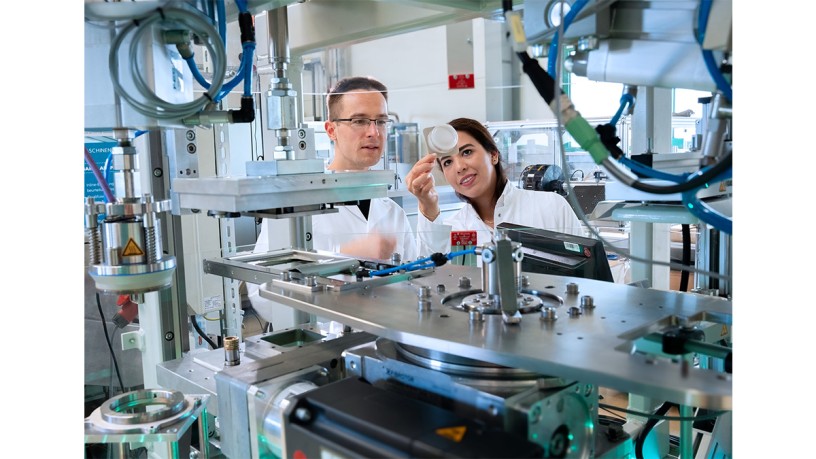Smart Drive Technology saves Energy and Costs
In this Article:
Hygiene, precision and efficiency – increasing demands on drive systems
In the food industry, the demands placed on modern drive solutions are constantly increasing. "Due to the request for more compact lines, drives are increasingly moving closer to hygienically sensitive areas," explains Sarah Herberger, Solution Manager at SEW-EURODRIVE. This affects the protection class and the overall design. Corrosion-resistant, easy-to-clean materials – such as stainless steel with smooth surfaces – and well-designed sealing concepts prevent dirt pockets and make cleaning easier.
In addition to hygiene, process dynamics play an increasingly important role. Higher cycle rates require fast, precise and synchronised movements, for example during portioning, packaging or conveying. The focus is also on energy consumption: Today, efficiency is primarily achieved through the coordinated interaction of control systems, frequency converters and servo geared motors. Frequency converters adjust the speed to the demand, the control system coordinates the movements, and the geared motor converts the energy into mechanical work with low losses. "Especially in continuous operation, even minor savings add up to a significant effect – both ecologically and economically," emphasises Herberger.
Stainless steel servo geared motors – sustainability in daily operation
The stainless steel servo geared motors in the CM2H series from SEW-EURODRIVE are available in five sizes with different lengths. They cover a nominal torque range from 1.0 to 103.6 Nm and offer four gear ratios per gearbox. In addition, there is the option of different standardised connection surfaces of the motors (B14 or B5 flange). This allows flexible combination with machine components and attachment to different gearbox types from the stainless steel portfolio. "This allows a motor-gearbox combination to be configured that is optimally matched to the respective application in terms of dynamics, torque and installation situation," explains Sarah Herberger. The stainless steel housing allows use in hygienically sensitive areas and facilitates cleaning. This reduces the use of water, cleaning agents and cleaning time – an advantage for operating costs and the environment.
Thanks to their precise controllability, high power density and low losses, the drives contribute to reducing the energy consumption of the entire system. In conjunction with the control systems of the MOVI-C® family, processes can be controlled according to demand and in a resource-saving manner. The robust stainless steel construction protects against corrosion and mechanical wear, extends service life and reduces maintenance requirements. "Less downtime and less material consumption – that's sustainability in action in everyday production," emphasises Herberger.

MOVI-C® automation kit from SEW-EURODRIVE with coordinated components for efficient drive solutions. Source: SEW-Eurodrive GmbH
Perfect interaction for maximum energy savings
A noticeable reduction in energy consumption can only be achieved if the motor, frequency converter and control system are precisely matched to each other. "Depending on the application, considerable savings can be achieved with a well-coordinated combination," says Sarah Herberger.
The frequency converter adjusts the speed of the motor precisely to the current power requirement. The control system, supplemented by sensors, continuously records operating conditions and evaluates them in real time. On this basis, the motor power can be regulated in a targeted manner – for example, by reducing the speed during load breaks or adjusting the speed to changing process requirements.
Each element contributes to efficiency: The motor converts electrical energy into mechanical movement with minimal losses, the inverter precisely controls the speed, and the control system ensures optimal coordination of all drives in the system. "Modern motors in the food industry now achieve efficiencies of over 90 percent," says Herberger.
Potential savings in high-speed lines and complex systems
In production lines with many synchronised movements, such as those found in high-speed systems, integrated multi-axis systems can offer significant energy and cost advantages over individual drives. "In addition to the savings achieved by synchronising the drives, we also rely on Power and Energy Solutions (PES) in addition to our MOVIDRIVE® Modular inverter family," explains Sarah Herberger. This is a performance and energy management system that specifically controls, optimises and reduces energy consumption.
The functions of the PES include load management for the even distribution of energy demand, energy buffering for short-term peak loads, recovery of braking energy (recuperation) and stabilisation of the grid supply. The integration of renewable energy sources is also possible. In practice, this means less energy loss, lower operating costs and greater reliability of supply. An integrated digital interface for encoders and sensors also reduces cabling requirements and lays the foundation for predictive maintenance. This in turn contributes to greater system availability and process reliability.

Stainless steel servo geared motors from SEW-EURODRIVE for hygiene-critical applications in the food industry. Source: SEW-Eurodrive GmbH
Economically modernising existing plants
Not every improvement in energy efficiency requires a complete new purchase. Thanks to compact designs and modular concepts, many drive components can now be integrated into existing machines. "Retrofitting older systems with modern, energy-efficient drive technology is now much easier and more economical than it was a few years ago," says Sarah Herberger. This enables food companies to reduce energy consumption and operating costs without having to carry out extensive renovations.
Summary
For food manufacturers who want to make their drive and system technology future-proof and energy-efficient, Sarah Herberger, Solution Manager at SEW-EURODRIVE, has three key recommendations:
- 1. Involve the drive manufacturer early on in the planning phase of a new system in order to optimally match components to the respective application.
- 2. Consider energy efficiency as an overall concept – beyond the individual drive and in the interaction of all system elements.
- 3. Carefully check the longevity of the components used in order to reduce maintenance and operating costs in the long term.
Herberger also emphasises the importance of a reliable service partner who provides support not only during commissioning, but also during maintenance, optimisation and long-term support for the systems.
Increasing demands on hygiene, energy efficiency and process dynamics require solutions that combine technologiive systems lay the foundation for efficient and future-proof food production.
For additional information, go to:
Sarah Herberger,
Product Life Cycle Manager Mechatronics
SEW-EURODRIVE GmbH & Co KG
Ernst-Blickle-Str. 42
76646 Bruchsal
Germany
sew-webmaster@sew-eurodrive.de
https://www.sew-eurodrive.de/startseite.html




